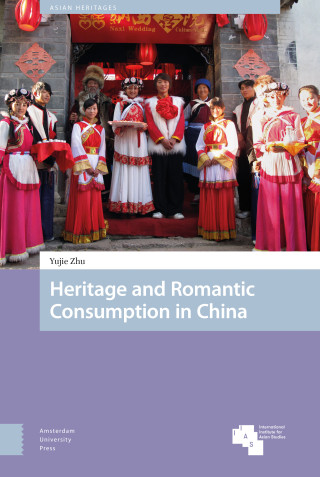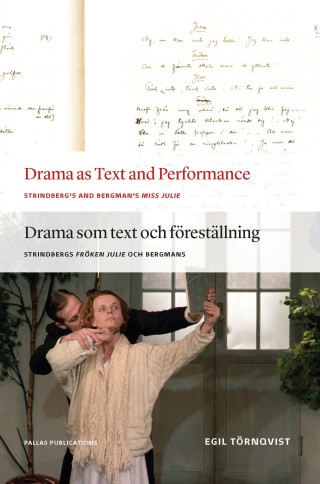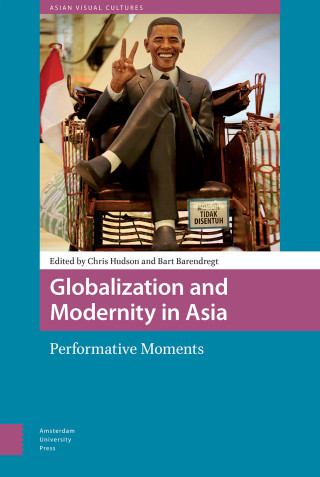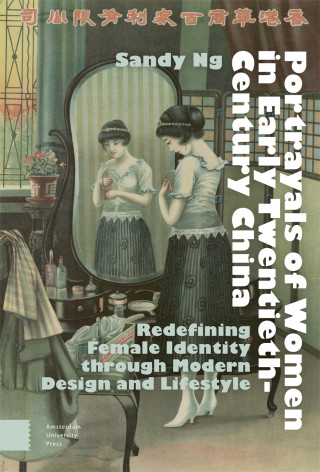
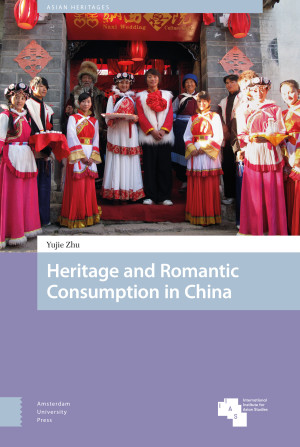
- Title
- Heritage and Romantic Consumption in China
- Author
- Yujie Zhu
- ISBN
- 9789048536825
- Format
- eBook PDF
- Number of pages
- 168
- Language
- English
- Publication date
- 15 - 08 - 2018
- Dimensions
- 15.6 x 23.4 cm
- Open Access
- Download on Open Access Platform
- Series
- Asian Heritages
- Partner

- Category
- Heritage and Memory Studies
- Discipline
- Asian Studies
- Preview
- Download Preview
- Also available as
- Hardback - € 108,00
Table of Contents
Prologue: Somewhere in Time
Introduction
Lijiang Old Town and the Naxi
Ethnic Tourism in China
Cultural Heritage in China
Romantic Consumption
Authenticity, Authentication, and Customization
Why the Naxi Wedding Courtyard?
A Note on the Method
Theatre of the Book
Chapter 2 Stage
Reconstructing a World Heritage Site
The Development of Mass Tourism
Becoming a Town of Romance
Transforming into a Capital of Love Affairs (Yanyu)
Creating a Cultural Theme Park
Conclusion
Chapter 3 Scripts
Dongba as Religious Practitioners
Transformations of Dongba Practices since 1949
Traditional Naxi Wedding
Current Marriage Customs in Lijiang
The 'Dongba Wedding' in the Courtyard
Conclusion
Chapter 4 Local Actors
The Manager Mr. Liu
The Dongba Fuhua
The Adviser Prof. Ming
The Moderator Mei
The Dancer Chao
Locals' Responses: Hope and Frustration
Conclusion
Chapter 5 Guests
The Honeymooners Vincent and Lulu
New Lijiang Residents Tony and Kitty
He Gang from Naxi Mama
Foreign Tourists Marina and Johnson
Conclusion
Chapter 6 After the Show
Wandering Between Dream and Reality
Embracing New Home
Resistance, Coping and Departure
Conclusion
Chapter 7 Conclusion
Romantic Consumption and Customization
Global Significance of a Local Courtyard
Epilogue: The Show Must Go On
Bibliography
Reviews and Features
"Heritage and Romantic Consumption in China is a beautifully structured monograph possessing a reasonable balance between sharp political analysis and ethnography which demonstrates sensuous feeling and embodied practice."
- Geng Li, The Asia Pacific Journal of Anthropology (2020)
"Tourists come to Lijiang looking for love and romance, only to become dissatisfied and disillusioned with the place, leaving it to locals to come up with new forms of attraction and alterity. This is a story with which tourism scholars are also familiar, but it is a story that few have told as comprehensively as Yujie Zhu."
- Tim Oakes, The China Journal, No. 83, January 2020
"Heritage and Romantic Consumption in China presents a very intriguing and in-depth ethnographic investigation of the politics of intangible heritage and heritage tourism in China. As such, its contribution to the heritage and museum studies literature, including tourism studies, is significant and certainly stretches beyond the context of China and Asia."
- Song Hou, International Journal of Heritage Studies, 26:3 2019
"This most sophisticated and provocative work weaves together intangible heritage, performance and authenticity. At the hinge of ethnic tradition and (post)modern individual consumerism, this book focusses on a leading edge of change in Chinese civilization."
- Nelson Graburn, Professor Emeritus of Anthropology, University of California, Berkeley
"Yujie Zhu has given us an incisively grounded account of how a centralized nation-state shapes local and minority heritage and channels it into the production of commodified sentiment."
- Michael Herzfeld, Ernest E. Monrad Professor of the Social Sciences, Harvard University
- Geng Li, The Asia Pacific Journal of Anthropology (2020)
"Tourists come to Lijiang looking for love and romance, only to become dissatisfied and disillusioned with the place, leaving it to locals to come up with new forms of attraction and alterity. This is a story with which tourism scholars are also familiar, but it is a story that few have told as comprehensively as Yujie Zhu."
- Tim Oakes, The China Journal, No. 83, January 2020
"Heritage and Romantic Consumption in China presents a very intriguing and in-depth ethnographic investigation of the politics of intangible heritage and heritage tourism in China. As such, its contribution to the heritage and museum studies literature, including tourism studies, is significant and certainly stretches beyond the context of China and Asia."
- Song Hou, International Journal of Heritage Studies, 26:3 2019
"This most sophisticated and provocative work weaves together intangible heritage, performance and authenticity. At the hinge of ethnic tradition and (post)modern individual consumerism, this book focusses on a leading edge of change in Chinese civilization."
- Nelson Graburn, Professor Emeritus of Anthropology, University of California, Berkeley
"Yujie Zhu has given us an incisively grounded account of how a centralized nation-state shapes local and minority heritage and channels it into the production of commodified sentiment."
- Michael Herzfeld, Ernest E. Monrad Professor of the Social Sciences, Harvard University
Yujie Zhu
Heritage and Romantic Consumption in China
The drums beat, an old man in a grand robe mutters incantations and three brides on horseback led by their grooms on foot proceed to the Naxi Wedding Courtyard, accompanied, watched and photographed the whole way by tourists, who have bought tickets for the privilege. The traditional wedding ceremonies are performed for the ethnic tourism industry in Lijiang, a World Heritage town in southwest China. This book examines how heritage interacts with social-cultural changes and how individuals perform and negotiate their identities through daily practices that include tourism, on the one hand, and the performance of ethnicity on the other. The wedding performances in Lijiang not only serve as a heritage 'product' but show how the heritage and tourism industry helps to shape people's values, dreams and expectations. This book also explores the rise of 'romantic consumerism' in contemporary China. Chinese dissatisfaction with the urban mundane leads to romanticized interests in practices and people deemed to be natural, ethnic, spiritual and aesthetic, and a search for tradition and authenticity. But what, exactly, are tradition and authenticity, and what happens to them when they are turned into performance?

